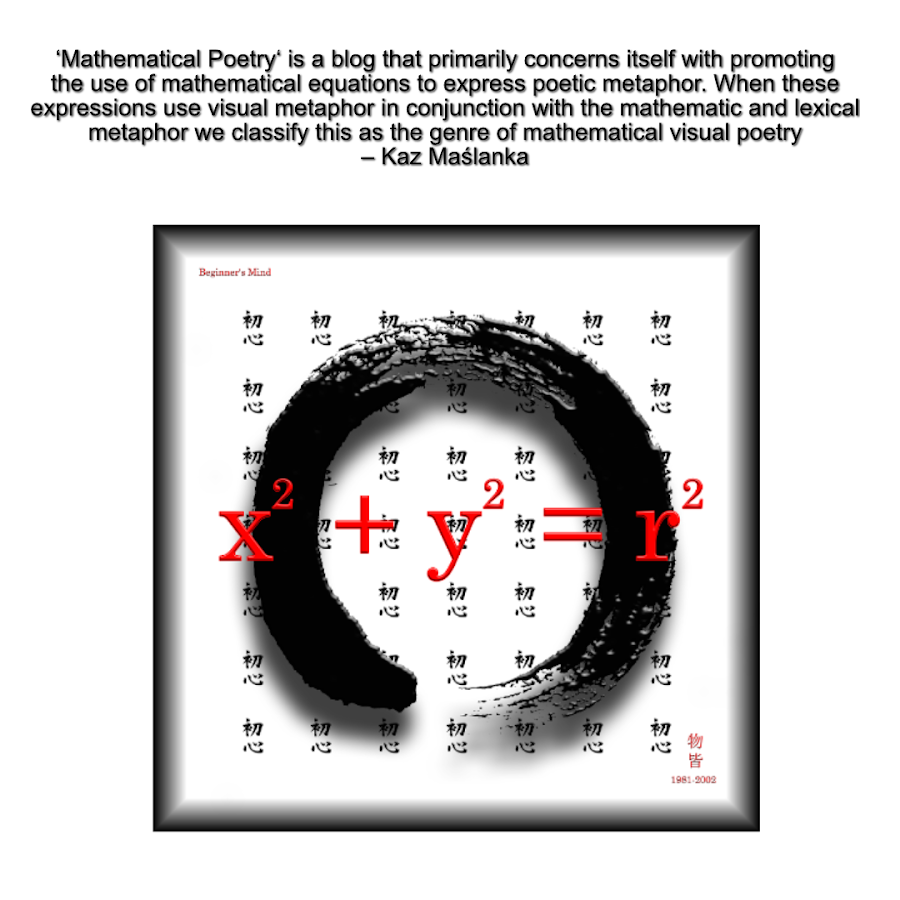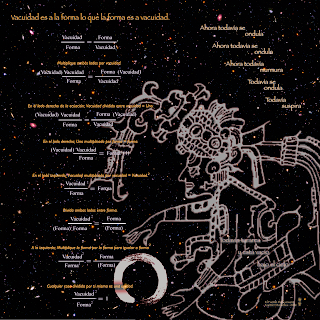Tuesday, May 24, 2022
Friday, April 08, 2022
El Puente Del Corazon (The Bridge of Heart)
The piece that I chose to submit to the show titled — “Kinetics Art that Moves You” is a mathematical visual poem titled: El Puente Del Corazón (The Bridge of Heart) 56"x 56" polyester digital print
The piece involves bridging two historic traditions from opposite sides of the world. (Central America and East Asia) The concept of emptiness is found in the Mayan creation story described by the Popol Vuh yet, emptiness is also a fundamental concept of the Heart Sutra, an important tenet in the tradition of Zen Buddhism.
In the context of mathematics, the piece uses a "Similar Triangles Poems" mapping across two sets of corresponding legs found in similar triangles (a/b = c/d) to express the statement: "Emptiness is to Form as Form is to Emptiness." In mathematical form: (Emptiness divided by Form is equal to Form divided by Emptiness) Algebra is then used to simplify the expression in order to point at the concept of "Oneness" or atonement. Atonement is generally thought of in a Christian context and relates to sin. In this context we can think about karma and how it can be burnt away by enlightenment. I would like to use a quote from Sam Harris to help us understand the phrase used in the mathematical poem.
In the Prajna Paramita Sutra (Heart Sutra) it is written that form is emptiness and emptiness is form. Form is not other than emptiness and emptiness is not other than form. Emptiness in this context, refers to what experience is like prior to conceptualization. Everything is simply appearing and at the level of experience everything is inseparable from consciousness itself - or what ever you want to call this condition of appearance. So there are no things, really - there is just this display of appearances. And consciousness is not one thing either - nor is it many - it is merely open and without definition and yet it allows for everything to appear without impediment. It’s no mere vacancy. Rather it is vividly aware of itself - as itself. Ceasing to overlook this condition where ever you are whatever is apparently happening - is meditation.
Within the imagery of the work a circular shaped 'Il won sang', (enso) Zen Buddhist symbol of emptiness, appears as the Mayan creator God reaches for it. A quote from the Popol Vuh follows
(English Translation):
Now it still ripples
Now it still ripples
Now it still murmurs
Ripples
It still sighs
Still hums
And it is empty under the sky
Here is the English translation of the left side of the work:
For a deep dive into the cognitive linguistic view of Similar Triangles Poems read this paper: A Cognitive View of Pandemic Meditations.
Label information
Title: El Puente Del Corazon (The Bridge of Heart)
The Piece is 56" x 56" Polyester weave / sealed acrylic digital print
The show opens Thursday April 14th 2022
5 PM to 8 PM
The Art Center
200 E 12th St, National City, CA 91950
Posted by
Kaz Maslanka
at
11:11 PM
0
comments
![]()
Labels: Form is Emptiness Emptiness is Form, Popol Vuh, similar triangles poems, Zen
Wednesday, July 29, 2020
What Is Wet?
Posted by
Kaz Maslanka
at
11:09 AM
0
comments
![]()
Labels: mathematics poetry, Religion, Seon, similar triangle poems, similar triangles poems, Spiritual art, Spirituality, Thinking, Thought, Truth, Zen
Saturday, August 17, 2013
Sunday, March 31, 2013
Sunset Sutra
Posted by
Kaz Maslanka
at
3:17 AM
2
comments
![]()
Labels: Buddhism, orthogonal space poem, Zen
Saturday, February 09, 2013
Mathematical Zen Poems By Karl Kempton
Posted by
Kaz Maslanka
at
2:42 AM
1 comments
![]()
Labels: Karl Kempton, Zen
Friday, September 30, 2011
Don't Think About This
Posted by
Kaz Maslanka
at
1:54 AM
0
comments
![]()
Labels: Buddhism, proportional poems, Seon, similar triangles poems, Zen
Wednesday, December 02, 2009
Bathing Ghosts
Here is a Proportional Poem titled "Salvation". This was inspired by my recent visit to the Korean Zen Temple Songgwangsa The image above is a detail from the image below
The image above is a detail from the image below
Posted by
Kaz Maslanka
at
12:07 AM
3
comments
![]()
Labels: Buddhism, proportional poems, salvation, similar triangles poems, Songgwangsa, Zen














